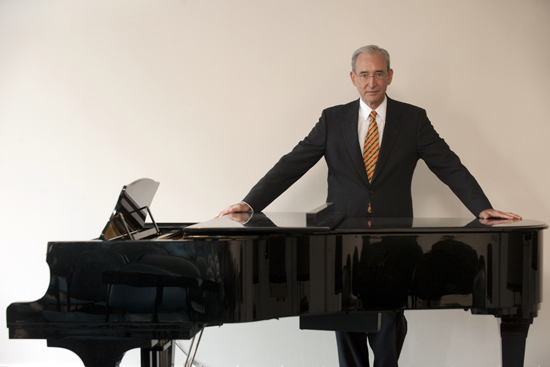Robert Dodson: Performer’s Ear, Educator’s Eye
New school of music director seeks broad experience for students

In his first weeks at Boston University, Robert Dodson is taking a fitting course of action for a music educator: he’s listening.
“Whatever successes we have will be an expression of our collective vision,” he says. “I have a lot of listening to do.”
Dodson, the new director of the College of Fine Arts school of music, has made a career out of trusting his ear. As an undergraduate, he left a liberal arts college and followed his passion for music, first to the New England Conservatory, then after seeing a performance by legendary cellist János Starker, to Starker’s academic home at the Indiana University Jacobs School of Music. His work as a performer and an educator has taken him across the United States and abroad. Now, as he settles in at CFA, his background shapes his hope for Boston University’s music students: that they take their art as far as it can go, while acknowledging that the world beyond music offers vital experience, too.
“My interests have ranged well beyond music,” Dodson says. “I hope that makes me flexible, able to realize that each individual has unique attributes and gifts and should be able to pursue them in highly individualized ways. I don’t have a great deal of confidence in recipes for education.”
A cellist who played with the Vaghy String Quartet for 11 years, Dodson brings a performer’s sensibility to his work as an educator and credits his time on stage with his success in academia. Performing, he says, builds the ability to work under pressure and to collaborate — both key for musicians and educators. His personal history also helps him recognize the need to balance intensive training with broader interactions.
“You want to give students essential experiences to discover their limits, how far they can pursue excellence and how far they can pursue breadth,” he says. “Music is a very exacting discipline, and it’s important to take a break from it and get out of the practice room. Walk through a rose garden, read a book for the fun of it — in other words, get a life.”
David Campbell, the University’s provost and an amateur vocalist, says that Dodson’s musical studies demonstrate a commitment to “the highest standards of performance pedagogy. We are delighted that he has joined us.”
Dodson also brings three decades of work at conservatories, including as provost of the New England Conservatory, dean of the Oberlin College Conservatory, dean of the Lawrence University Conservatory, and principal of the Royal Conservatory of Music in Toronto. Most recently, he was director of the Division of Music in the Meadows School of the Arts at Southern Methodist University.
“There seems to me such a clear alignment of presidential intent, provost commitment, and dean intent that the school of music flourish both as a professional school of music and as part of the University,” Dodson says. “So there are multiple roles: a duty to students, to the city of Boston, and to the profession.”
Dodson says it’s too early to set an intention for the school of music, but he is particularly pleased about one new initiative: a minor in music performance now available to any undergraduate. He’s also hoping to improve communication and collaboration between the BU Bands and the student ensemble groups. Most of all, he wants students and faculty to help spread what he calls “one of the most wonderful resources we have in life”: good music.
“So much of this world is awash with music that isn’t very thoughtful,” he says. “One of the things our students can give to the community is music deeply thought about and pursued to very high standards. Music is for everyone, not just for those who make it.”
Jessica Ullian can be reached at jullian@bu.edu.
Comments & Discussion
Boston University moderates comments to facilitate an informed, substantive, civil conversation. Abusive, profane, self-promotional, misleading, incoherent or off-topic comments will be rejected. Moderators are staffed during regular business hours (EST) and can only accept comments written in English. Statistics or facts must include a citation or a link to the citation.